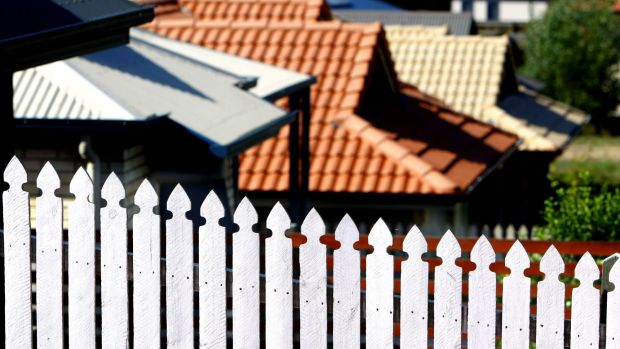There are two four-letter words you will never hear escaping from the lips of politicians.
One is "rich" and the other is "poor".
More National News Videos
Government's new housing battle
The Treasurer's idea to allow first homebuyers to access their super to get into the market, has been criticised from all sides, including within the Coalition.
Tune into question time on any given day and all manner of euphemisms are used instead - "hard-working families", "battlers", "lifters and leaners" and "millionaires".
Even the Prime Minister - a rich man by anyone's standard - can't describe himself as such.

"We've worked hard, we've paid our taxes, we've given back," Mr Turnbull said shortly after becoming Prime Minister in 2015, in an attempt to deflect Labor's accusation that a man of his means could not understand the lives of ordinary folk.
The budget is now four weeks away and the framing of who deserves help from the government and who should work harder for that help is well under way.
The big issue - housing affordability - is emerging as the new class divide.
No longer are people working class, middle class or upper class - they can either afford to be home owners or they cannot.

Judith Brett, emeritus professor of politics at Melbourne's La Trobe University, says the housing debate is "bizarre".
"If you talk about inequality, housing is now an enormous issue. It's not just about having a job, it's also about having parents who can afford to help [with a deposit]. That's going back to a Jane Austen kind of time when access to capital was a major determinant of life choices. That wasn't the case for me and my parents' generations."

Income is still important but so is a source of capital separate to someone's salary.
Brett, whose book Menzies' Forgotten People examined the post World War 2 Liberal Party's cultivation of the middle class, scratches her head when she considers the modern day Liberal Party's approach to housing.

Under Sir Robert Menzies it "was the party that did everything it could to promote home ownership," Brett says.
"The Liberal Party now seems to be very confused. It seems to be protecting home ownership as a form of investment."

Immediately after World War 2, levels of home ownership hovered at about 50 per cent in the cities; the working classes were life-long renters.
"Menzies worked very hard to turn that around through war service loans and banks having to put aside money for housing loans. That was central to what the Liberal Party stood for," Brett explains.
As result, home ownership levels began to rise.
Contrast this to today, where budget speculation has been dominated by what measures - if any - the Turnbull government will introduce to make home ownership feel more like a realistic aspiration.
"Housing affordability is very damaging to the credibility of the Liberal Party in terms of its political position. Menzies was very keen not to be seen as a party of the wealthy and the current Liberal Party has a problem with that at the moment," Brett says.
Owning a home in Sydney or Melbourne is quickly becoming the new class divide.
Debates in Parliament about whether or not an income of $180,000 makes someone rich seem nonsensical to someone trying to buy their first home at a time when median property values were a record $1.123 million in Sydney at the end of 2016 and $795,447 in Melbourne.
A politician's advice that home buyers should get good jobs or get their parents to help them out seems particularly tone-deaf when the median prices of apartments and units has reached $711,256 in Sydney and $459,181 in Melbourne.
Earlier this week Justice Party senator Derryn Hinch said home ownership was no longer something young people should feel was their right.
"The problem here is that people - I get it's unpopular to say this - but owning your own home is not an Australian right. It's a dream and everybody wants to do it," Senator Hinch said on Tuesday.
"I think [my parents] were in their 40s before they could afford to buy their first home. It's not something you're meant to get - the two-car garage [house] when you're 22. I think... that this generation and the one before think that's the way it has to be. Well, I'm afraid it's not that way."
Add to this stagnating wage growth and a widening gap between the top 10 per cent of income earners and the bottom 10 per cent and it is not difficult to see why the Australian National University's 2016 election survey found Australians' satisfaction with democracy has collapsed to its lowest level since the Whitlam dismissal with more than half the people surveyed saying politicians were out of touch and only governing for a few big interests.
Earlier this week the Australian Bureau of Statistics revealed the typical Australian was a 38-year-old woman living with her husband and two children in a three-bedroom house with a mortgage.
But the typical politician, according to Buzzfeed, was a married 51-year-old father of two, who owned two homes and was called Andrew.
"Obviously this budget will be about housing affordability. Housing and class defines your position more than it ever did before," Nicholas Biddle, deputy director of the Australian Centre for Applied Social Research Methods at the Australian National University, says.
Home ownership is now a "signal of middle classness" and something that seems further and further out of reach for people with incomes at the lower end of the scale.
Dr Biddle says it might feel as if people are able to climb up society's rungs but their ability to do so has decreased in recent years.
"In Australia there's less mobility than there was in the 1950s and 1960s," he says, pointing to post-war migration and the opening up of the higher education system as mechanisms that allowed people to rise through the ranks.
What academics call "associative mating" became more common.
"Previously you would have had a relatively low educated mother with a more highly educated father and everyone goes up," Dr Biddle explains.
Now "people tend to marry people from within their group".
Neighbourhoods are becoming more homogenous and education has become about "getting your children into the top school and the top university".
All of this is "bad news for people at the bottom", Dr Biddle says.
Someone with direct experience of this is Olga Srbovski.
Srbovski has worked for The Smith Family for nearly 15 years in Canberra, Wollongong and regional NSW.
She sees first-hand the struggle faced by the people at the bottom and believes Australia must confront the emergence of a new class - the working poor.
"There's so much hidden poverty. People are working but they're just scraping by," Srbovski says.
Housing is a bigger and bigger issue each year. The waiting times for public housing are increasingly forcing people to seek affordable private housing.
The services she oversees - such as programs to help families with education costs - are becoming increasingly stretched.
"We're beginning to see more and more families coming in and saying 'we're really struggling'. What we're finding is that more and more classes are asking their kids to bring in their own tablet. If you have three kids and the class is asking you to come in with a tablet it's incredibly expensive. It's all of the added costs."
Families are facing multiple types of disadvantage in addition to financial stress - housing pressures, family violence, disability, mental and other types of health issues.
Srbovski worries about the children in families struggling to overcome these issues.
"It stresses the kids watching their parents struggle," she says.
"They don't go to swimming lessons or play sport. It's a real issue for our young kids. We're seeing a lot of anxious kids. They become isolated, disengaged. That affects how they go through later life. If you're not building relationships when you're young then how hard is it to do it later in life?"















